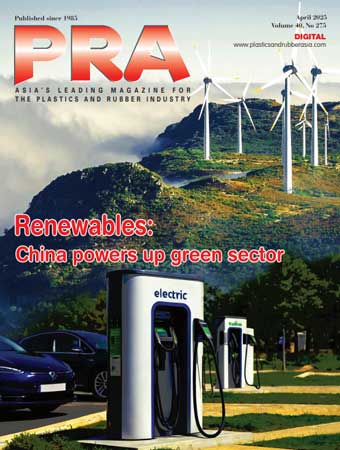K2025: Machinery for PET/rPET
Catering to sustainability: MEAF, KraussMaffei, Kiefel, Herbold, Kreyenborg
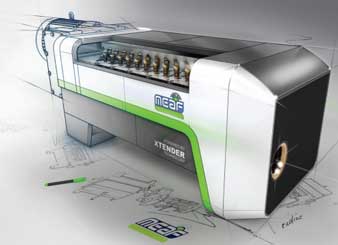
Dutch machinery firm MEAF Machines will launch its new Xtender polymer melt co-processing technology. Developed in collaboration with an Italian partner, it increases the intrinsic viscosity (IV) value of rPET using a patented process and can be (retro)fitted on both single-screw and twin screw extruders.
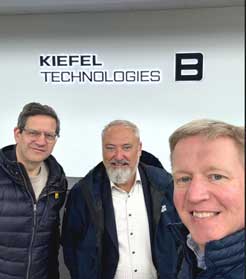
Located directly downstream of the extruder, the melt is transported axially through a disc processor consisting of several wedge-shaped discs, where contaminants and unwanted gases are extracted from the polymer by means of a vacuum. The temperature of the melt is regulated by heating elements and a core cooling element, while the setup includes two inline viscometers to detect and control the IV, as well as an adjustable feed for additives to accelerate the condensation reaction.
Germany’s Kiefel is presenting its latest Speedformer KTR 6.2 Speed tilting machine, which will be shown producing rPET cups, tested in advance in collaboration with film partner Coexpan. Features include the patentpending SpeedGuard film guide and ProSpacing system, which ensures higher output even when handling varying product geometries.
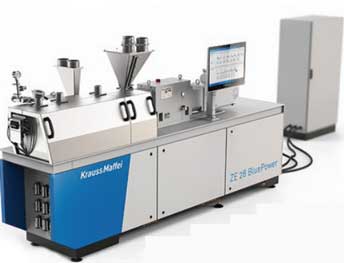
Meanwhile, KraussMaffei Extrusion will present a twin-screw system based on the BluePower series for outputs of up to 12 tonnes/hour. Compared to conventional twin-screw systems, energy consumption can be reduced by up to 20%. The systems are compatible with standard SSP units and produce foodgrade rPET.
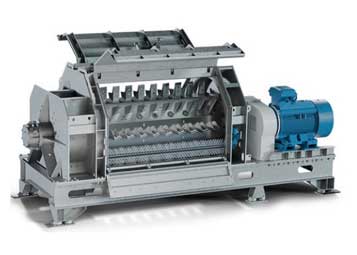
Auxiliary equipment maker Herbold Meckesheim, a brand of Coperion will present solutions for mechanical processing, including the new high-capacity mechanical dryer T150-300, with output of up to 2.5 tonnes/hour of film or 10 tonnes/hour of PET or rigid flakes, and the latest SMS granulator model.
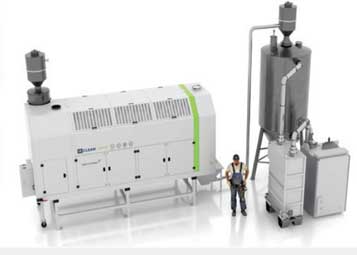
Elsewhere, German firm Kreyenborg will be demonstrating both a continuous system and a batch version of the infrared rotary drum (IRD). It has developed the IRClean system in addition to the IRD’s classic crystallisation and drying. The rPET flakes are heated from the inside to the outside in just a few minutes, with decontamination performance of the IR Clean achieving a cleaning efficiency of over 95%.
It thus, meets both the EU/EFSA and the US-FDA criteria, with the treated material approved for food packaging. Kreyenborg has also developed a process for deodorising regrind before or after the extrusion process (IR-Fresh system), which can be retrofitted on extrusion lines.
Blow moulding machinery for PET bottles: ASB; Cypet
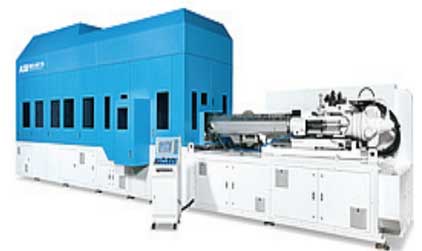
Japan’s Nissei ASB will introduce what it says is the world’s first 1.5-step machine capable of moulding double blow heat-set returnable and refillable PET bottles directly from resin. Combining the strengths of one and two-step moulding, ASB’s technology increases material crystallinity and reduces stress, enhancing thermal stability and resistance to environmental stress cracking. The bottle, weighs 90 g, 7.5% lighter than the industry standard, and uses up to 30% rPET, thus, meeting global standards with a 4.2 gas volume rating, making it suitable for carbonated soft drink brands and capable of more than 25 return and refill cycles.
In terms of single-stage Injection Stretch Blow Molding (ISBM) systems, Cypet Technologies says it will display of what it says will be the world’s largest blow-moulded 1,000 l PET bottles, made for an Indian company on its K185 ISBM machine. The Cyprusbased firm will also present its Pro Series, capable of producing bottles from 20ml to 50 l with an output up to 15.000 bottles/hour.
(PRA)SUBSCRIBE to Get the Latest Updates from PRA Click Here»

